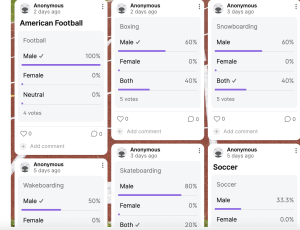Chapter Two
Exercise two Notebook prompt:
1991- The IAAF officially ends mandatory sex testing but reserves the right to test individual athletes if concerns arise. Important because it started a shift from invasive policies and it reduced the humiliation occurring to all female athletes. It did still allow for targeted testing.
2011- The IAAF introduces hyperandrogenism regulations, restricting female athletes with naturally high testosterone levels from competing in certain events unless they medically lower their testosterone. Began a shift from sex verification being a binary test to one of based on hormone levels which sparked ethically concerns about the biological advantages and medical interventions that could occur.
Exercise three Notebook prompt:
Gendering has not be a direct constraint in which I have dealt with as I have possibly aligned with traditional categories, been able to participate in co-ed and recreational sports. I grew up in environments which emphasized inclusion over rigid gender divisions and I am very grateful for that. I do understand though I haven’t directly been impacted by this the broader impacts of gendered sports structures such as with pay gaps, how the media coverage is and respect that certain athletes receive all have had an indirect affect on my experiences.
Exercise four Notebook/padlet prompt:

These polling figures mostly align with the traditional gender-coding in sports as having American football in the poll at 100% is mostly accurate as it is seen as a highly masculine sport due the physicality at play and the aggression required which in gender coding would seem as women wouldn’t be able to compete in something like that. The results serve as an indicator of the ingrained gender norms still at play in sports and how far we still have to come where we see numbers which are more even amongst men and women.
Exercise five Notebook prompt:
Leah Thomas I do believe raises a valid point when it comes to her talking about the scale in which of trans women’s athletes participating in sports and the long-standing policies in which the NCAA had which has lead to no having widespread domination. Just speaking numbers trans women make up such a small amount of female athletes and there is no indication that there is an unfair advantage and they are dominating and ruining the sport for other women. There is little evidence to suggest their inclusion has alter competition in sports. The political discourse which has followed this discussion has in many instances been overblown and become disproportionate when this people claiming to be looking out for women sport are now just coming out of the woodwork wanting to protect women’s sports, have done very little to nothing to actually have concern and desire for change in women sports with coverage, pay disparities etc. There is a right to discuss fairness in competition to ensure there is a level playing field for everyone but the debate can often be fueled by misinformation being spread and agendas wanting to be pushed instead of genuine care and desire to protect and support women’s sports.
Exercise six Notebook prompt:
Rose Eveleth discusses the concept of “unfair advantage” in sports in particular with athletes who have different sex development. She highlights that sports organizations have implemented tests in which to determines athletes elgibility and has lead to discrimination against many. She points out that many athletes possess traits and abilities in which other athletes simply do not possess. These can enhance their performance yet only sex and gender are scrutinized. Michael Phelps has a long torso and very wide wingspan which aide in why he is able to do what is can and it provides an advantage against other swimmers. Other examples of this are Usian Bolt who has ultra quick twitch muscles and exceptional stride length help with his sprinting dominance. These examples show that while exceptional physical attributes can provide edges in sports, they are often celebrated which shows the inconsistences in how athletic advantages are perceived.
Exercise seven Padlet Prompt:
I do agree with Katie Barnes saying that sports are inherently unfair and yet we learn to accept that as inequalities are a part of the game. Athletic success is shaped by numerous factors beyond skill such as genetics and the training in which you can get to help you and even geography all help in contributing to disparities. Like in the Michael Phelps example he has certain biological traits which help him in swimming. Not to say he doesnt work hard or train to be the best but he has advantages which he uses. In my experience sports aim to create a fair competition through rules which hope to have fairness but it can be an illusion. The current debate over trans athletes and sex-based competition highlights how some of these so called ” unfairness” are more scrutinized than others because it can fit agendas and reveal deeper biases

